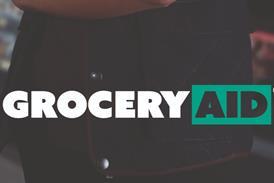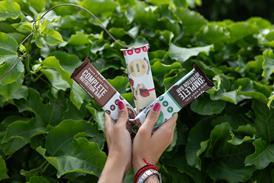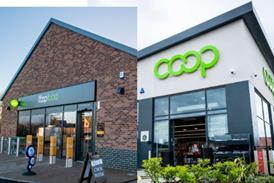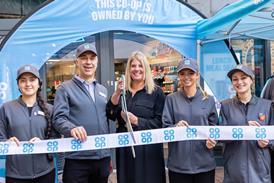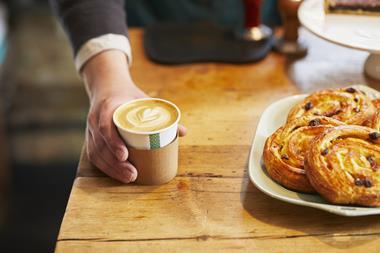When it comes to KVIs (known value items), milk and bread probably top most shoppers’ lists. So as farmers fight with dairy distributors over milk prices, independent retailers are fighting the grocery mults with theirs. And it’s easy to see why this is happening, when HIM’s Chilled Dairy Category Focus 2013 found that ‘cheapest price’ was rated as being very important for consumers when buying milk, and 70% of shoppers would like to see more half-price promotions on milk.
Four months ago, Londis retailer Sunder Sandher from Leamington Spa was selling 2ltr milk for £1.29. But then he read an industry report that said consumers were not using c-stores for milk because it was not being sold at £1. What followed for Sunder was some hard negotiating with his independent supplier, Freshways, to get his milk down to the magic £1 mark.
Bread winners
Bakery is the fourth most important category for bringing customers into a convenience store (HIM Convenience Tracking Programme) so make sure it’s prominently located in your store and consider cross-selling by placing it near milk for the morning rush, or near spreads for teatime treats.
Freshness is key - 71% of customers check the sell-by dates on products while in store. In order to keep product on-shelf as fresh as possible, Allied Bakeries suggests regular and timely stock rotation
Having a full fixture between 7-9am is crucial as this is the busiest time for bakery shoppers - retailers who are unprepared for the rush may find they miss out on sales
Displaying products side-on can really boost sales - and ordering products by size and colour will make the range look really appealing
POS merchandising is crucial for signposting customers to new products and promotions, as well as encouraging top-up purchases
Follow the trends - for example, retailers keen to focus on the popular healthier breads market might consider stocking Kingsmill 50/50, which is a white bread made with 50% wholegrain flour that provides 55% of the daily wholegrain allowance in two slices.
Source: Allied Bakeries
He says: “It was a tough negotiation but they agreed - only if I doubled my sales. I said I was willing to give it a go for three or four weeks, and it worked. I sell more I have no wastage and I’m still making a margin.”
However, Sunder says it’s no use selling milk for £1 if you’re not going to shout about it to customers. “We highlight our prices on a blackboard outside - you’ve got to let people know about it.”
Adds Sunder: “You’ve got to have smart pricing on KVI lines, otherwise it can make your whole store look expensive.”
The future is freshly baked
Demand for freshly baked bakery products has increased by 20% since 2011. So says the Lantmännen Unibake 2013 Bread Barometer.
The survey, which quizzed consumers across five European countries, revealed that in the UK, “freshly baked” is seen as the most important reason for buying bakery products - cited by 35% of respondents as their primary reason for purchasing bakery goods.
Other findings included:
73% of respondents said they are tempted to buy bakery products when they smell fresh baking.
Demand for quality remains high, with 87% of people saying that taste was an important factor in driving purchase. And taste trumps health for 40% of people, while price promotions and in-store offers are less of a priority for many, with 41% of those surveyed citing quality as more important than price and good offers.
And it’s not a new strategy for him. “Thirty years ago when I first started out, I was selling milk and losing 5p on every pint. Other local retailers queried my prices, saying they could not buy it in at the price I was selling it at, but I stuck to my guns as it brought people in.”
So today in Sunder’s 1m milk display you’ll find Freshways 2ltr - semi and whole - for £1. There is also Freshways 1ltr skimmed for 99p, and single pints of whole, semi and skimmed for 55p. Also available is Country Life-branded milk at 99p for a litre.
“Some customers prefer to take the 1ltr of Country Life as they think 2ltr is too much for them,” he explains.
It’s the same ‘2ltr for £1’ story at Broadway Premier in Edinburgh, where they sell so much that it has to be delivered by a milkman every day. Retailer Linda Williams explains: “We get two cages of milk a day, mostly 2ltr jugs (about 120), then 1ltr and half-litre sizes.
“We’re a local destination shop, which is why we sell so much. We’ve always made sure that we are cheaper than our competitors.”
But not every independent is selling milk at £1. David Cox, who has a Spar store at his Saintfield Road Service Station in Lisburn, Co Antrim, says: “I know customers are looking for value, but I have resisted dropping the price to £1, even though I try to give a value message throughout the store. Our sales are 95% of 2ltr jugs. The cost price is about 87p and the retail is £1.36. The problem is that a lot of the shops are selling at £1 or 99p. I keep to £1.36 each or ‘2 for £2.20’. The sales mix of singles at £1.36 and ‘2 for £2.20’ works out at £1.17 per jug on average.”
About 70% of his sales come from semi-skimmed. “Full fat takes up the rest. We sell very little of anything else. We keep a few pints, but it is really all 2ltr jugs.”
David’s milk comes through Spar. “We are always in stock of milk. It is the golden rule to never, ever be out of milk or bread. People will come to you if they know they will get what they need.”
Staying in stock isn’t a problem for David as he gets deliveries six days a week. “We place the order at lunchtime the day before, for the next day,” he says.
When it comes to bread pricing, David says the story’s much the same as with milk. “We try to be as competitive as possible. White loaves are the big sellers and we have no choice but to be keen on price. My customers would like to see a price point of £1 for bread, but I just won’t go that low. About £1.19 or £1.15 is my price. I should really be pricing them at £1.29-plus to be making a decent margin.”
In Leamington Spa, Sunder sells Kingsmill at just £1. “Londis brought the price down to a round pound, which was great,” he says. “We also sell Warburtons and Allinson. Warburtons wholemeal, for example, is priced at £1.75. Some people will only ever buy Warburtons whatever the price, while other customers will always buy the cheapest bread.”
Merchandising and selling milk
Müller Wiseman’s sales and marketing director, Sandy Wilkie, shares advice on merchandising and selling milk
Ensure that the refrigeration of the milk is below 5 degrees. We work hard to ensure the “chill chain” is not broken from the moment the milk is collected from the farm, to the point of delivery. It is vitally important that this is continued in-store for the quality of the product to be maintained.
Maintenance of the milk fixture is crucial. Our teams encourage retailers to review the chiller every hour to ensure it is tidy and that stocks have been rotated to minimise waste.
One statistic to consider is that most milk is sold after 3pm so it is important that this is taken into consideration when reviewing ordering.
Allow milk to be visible from the door. Making it visible from the door of the store and ensuring the most popular variants (2ltr semi-skimmed) are at eye level will help boost sales.
Alkesh Gadher, who has a Best-One in Isleworth, London, has 1.5m devoted to bread, where Warburtons is the best-seller, sold at rrp. He says: “In the past couple of months, Warburtons’ smaller loaves have been available pricemarked, and they sell really well. We also sell Kingsmill and Hovis. All our bread is branded. We have tried own label, but it doesn’t sell.”
There has been plenty of activity in the bakery category of late. Alkesh thinks it’s fantastic that new products are added regularly as it creates interest in the category, but he believes some lines are just too niche for him. “I look at some of the products and think I’ve not got a chance of selling them. If we see the rep, they’ll say try it for four weeks and you can have it on sale or return. But some of the varieties are so obscure I know we won’t need a month to see if they sell!”
Sunder, too, is keen to try new lines as he says his customers like them. “We’ll try new lines for a while - two to three weeks - but if they don’t sell we’ll knock them on the head. We get them on sale or return, so it’s not a big problem.”
Of the latest Warburtons’ lines, Sunder says Warburtons’ pitta breads for £1 are going well.
Warburtons category controller Martin Baptie says his company is committed to developing products which respond to the key consumer trends of health, convenience and variety, which in turn enable retailers to grow their bakery sales. “Retailers should always give more space to products in these growth areas in order to capitalise on the increased demand they generate,” he adds.
Getting your range right is paramount for bread and milk in their standing as key footfall drivers and frequent top-up purchases. And their value to you is undisputed, as IGD research in the ACS Local Shop Report 2013 revealed that bread and bakery still contributes 4.5% of sales to a typical store, and milk 3.3%.
In Brief
Online advice from Warburtons
Warburtons recently created a new trade website to offer retailers more control and flexibility over their orders and to help ensure availability. The website allows retailers to amend their standing orders and manage their invoices. In addition, it provides information about the Warburtons range and the latest bakery category advice on key areas such as merchandising to help retailers maximise sales.
Bottles shape up better
Cravendale 1ltr was given a makeover last spring, with stylish bottles replacing cartons. Cravendale brand manager Sophie Macaulay says: “Our consumer research tells us that customers tend to associate cartons with medical or niche, so we wanted to create a more modern, fun format for 1ltr.” Cravendale has also stepped into the food-to-go fixture for the first time, with a 500ml bottle retailing at 75p.
Help your community
Kingsmill is asking retailers for ideas to drive improvement in their local communities. The successful project will be awarded £2,000 and two runners-up £1,000.Entry is by emailing alliedtrade@lexisagency.com or tweeting @alliedtrade to request an entry form. Closing date is 10 November.
Source
Tracy West




